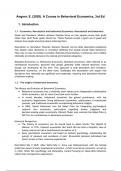Angner, E. (2020). A Course in Behavioral Economics, 3rd Ed
1. Introduction
1.1 - Economics: Neoclassical and behavioral Economics: Neoclassical and behavioral
Goals and Decisions: Modern decision theories focus on how people pursue their goals
rather than what those goals should be. These theories accept a given set of goals and
analyze how people should go about achieving them.
Descriptive vs. Normative Theories: Decision theories can be either descriptive (explaining
how people make decisions) or normative (defining how people should make decisions).
They may or may not overlap in practice. Rational-choice theories, in particular, aim to define
rationality and divide decisions into rational and irrational categories.
Standard Economics vs. Behavioral Economics: Standard economics, often referred to as
neoclassical economics, assumes that people generally make rational decisions, even
though not necessarily all the time. This approach is both descriptive and normative.
Behavioral economics, on the other hand, challenges this assumption and argues that
deviations from rationality are significant and systematic, requiring new descriptive theories
of decision-making.
1.2 - The origins of behavioral economics
The History and Evolution of Behavioral Economics:
● Behavioral economics has a relatively short history as an independent subdiscipline
within economics, but its roots trace back much further.
● In recent decades, behavioral economics has gained prominence, with top
economics departments hiring behavioral economists, publications in mainstream
journals, and traditional economists incorporating behavioral insights.
● In 2002, Daniel Kahneman won the Nobel Prize for integrating psychological
research into economics, particularly regarding human judgment and
decision-making under uncertainty. Richard Thaler also received the Nobel Prize in
2017 for his contributions to behavioral economics.
Historical Perspective:
● The history of economics can be traced back to Adam Smith's "The Wealth of
Nations" in 1776. Classical economists like Smith did not hold a simplistic view of
human nature but had a multifaceted conception of it.
● Early neoclassical economics was based on hedonic psychology, emphasizing the
pursuit of pleasure and avoidance of pain. Economists believed individuals had
direct access to their conscious experiences.
Post-World War II Shift: After World War II, there was disillusionment with the limited
predictive power of early neoclassical economics. A shift occurred in economics, as well as
in other fields like psychology and philosophy, toward focusing on observable behaviors
rather than introspective experiences.
, The Cognitive Revolution: In the 1950s and 1960s, a cognitive revolution took place across
multiple fields, including psychology, computer science, linguistics, and anthropology.
Researchers rejected a strict focus on the observable and advocated for studying
cognition, including beliefs, desires, symbols, rules, and images.
Behavioral Economics Emerges: Behavioral economics emerged as a product of the
cognitive revolution. Like cognitive scientists, behavioral economists are comfortable
discussing beliefs, desires, and mental processes, even though they are skeptical of early
neoclassical theories and methods. Behavioral economics remains fundamentally about
how people make choices under conditions of scarcity and the societal outcomes of those
choices, aligning with the core definition of economics. It is considered a kind of
behavioral science that integrates economics and psychology. The term "psychology and
economics" encompasses a broader category that includes any integration of the two
disciplines, not necessarily limited to choices. It signifies the interplay between
psychology and economics across various contexts.
1.3 - Methods
Methods and Data in Behavioral Economics:
● Hypothetical Choices: Early studies relied on participants' hypothetical choices.
● Thought Experiments: Some studies used scenarios to gauge readers' intuitions
about behavior.
● Laboratory Experiments: Later, experiments with real choices involving real money
became prevalent.
● Field Studies: Observing real behavior in natural settings, like studying cab drivers,
is increasingly common.
● Process Measures: Researchers use various methods, including brain scans and
process-tracing software, to understand cognitive processes.
Integration of Evidence:
● Behavioral economists use multiple methods to gather evidence, strengthening
their conclusions when results align.
Replication Crisis:
● The field has faced a replication crisis, with some results proving difficult to
replicate.
● Despite this, economics, particularly laboratory experiments, has shown relatively
high replicability compared to other disciplines.
● The crisis has led to self-reflection and optimism for improvement in social and
behavioral sciences.





